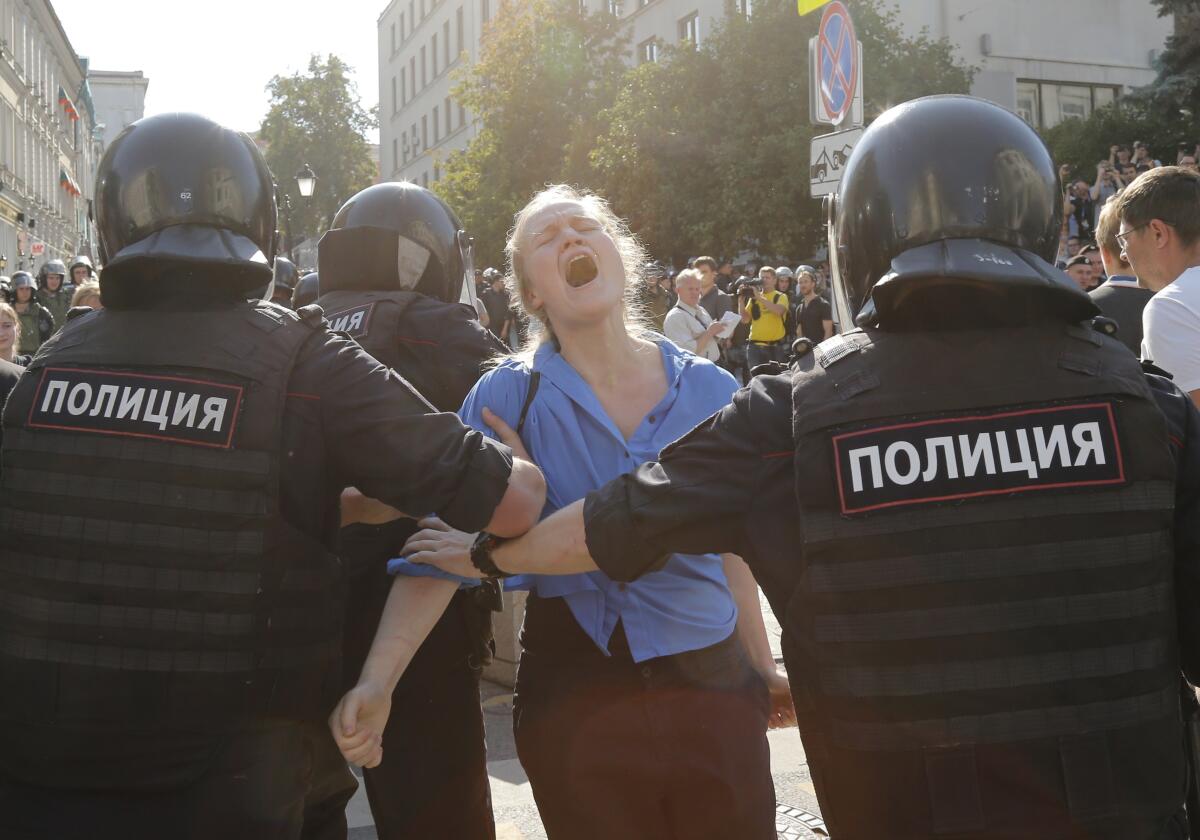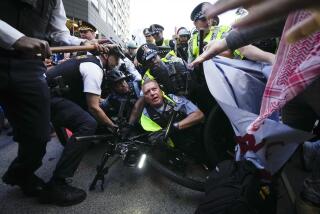Moscow police arrest more than 1,000 in protests for free elections

- Share via
MOSCOW — Moscow police detained more than 1,000 people including several prominent independent politicians Saturday and blocked the city’s major thoroughfares in an attempt to prevent a protest demanding that opposition candidates be allowed to run in a city council election.
Heavy police presence throughout the city kept what police estimated were at least 3,500 people from participating in the protest. The demonstration was the latest in a series of protests over the last month against the Moscow city government’s rejection of applications from independent candidates to run for the 45-seat Moscow city council on the Sept. 8 ballot.
While the protest, and others elsewhere in Russia, was sparked by a feeling of disenfranchisement in the local government decision-making process, the anger appears to have the Kremlin concerned. Trust in the central government has dropped in recent months, a year after Russian President Vladimir Putin was reelected to a fourth term by a landslide. Much of the hostility is due to Putin’s support for an unpopular pension bill that raises the retirement age by five years. In addition, Russia’s economy is stagnating while real incomes shrink and inflation rises.
Opposition leaders had called for Saturday’s protest to begin in front of Moscow City Hall on the Russian capital city’s Tverskaya Street, a broad avenue lined with Stalin-era buildings that ends at the Red Square and the Kremlin’s red walls.
Police cordoned off the sidewalks near the city hall hours early to prevent people from gathering. Walls of police officers in riot gear locked arms to form columns that pushed demonstrators into side streets, where small skirmishes between protesters and police ensued. Many were beaten with batons before being dragged into police buses and taken to detention centers.
Moscow Mayor Sergei Sobyanin sent out warnings earlier in the week that Saturday’s protest was unsanctioned and said participants would be prosecuted. In a tweet Saturday morning, Sobyanin said the opposition was planning provocations that could put the public’s safety at risk.
Sobyanin’s warning showed that the government was clearly shaken by last weekend’s demonstration in a Moscow central square that saw 22,000 protesters calling for free and fair elections. The city government had granted a permit for that protest but was surprised when it grew into one of the largest in Moscow since 2012, when tens of thousands demonstrated against election fraud and government authoritarianism.
This month’s protests started after the Moscow Election Committee declared ineligible several independent candidates’ applications to run for a city council seat in a September election. The council currently is dominated by the Kremlin-favored United Russia party.
In recent days, Alexei Navalny, a leading opposition leader and fierce critic of Putin, was arrested and sentenced to 30 days in jail for organizing an unsanctioned demonstration. Police then searched the homes of and arrested at least four other opposition candidates seeking to get on the ballot and opened an investigation into their participation in a demonstration held outside of the election commission July 14.
The protests come at a time when Russians across the country are voicing their frustrations about a lack of local participation in regional issues. In the last two years, large protests with several thousand people have sprung up in regional capitals and in provincial cities outside of Moscow to demand the closure of garbage dumps. In Ekaterinburg, Russia’s third largest city, thousands protested against the city’s plans to build a large cathedral in one of its last remaining central parks. Authorities then agreed to relocate the cathedral’s construction site.
In Moscow, demonstrators said they were tired of blatant corruption associated with an expensive makeover program that has torn up and replaced sidewalks and streets across the city of nearly 13 million people. As lucrative procurement deals have been approved by City Hall, residents have had little say on the spending, protesters said.
“The government has made a mistake, and it’s showing its weakness,” said Viktor Yelkin, 69, a retired military officer. “The powers don’t want to let the opposition candidates on the ballot because they know that people will vote for them.”
More to Read
Sign up for Essential California
The most important California stories and recommendations in your inbox every morning.
You may occasionally receive promotional content from the Los Angeles Times.










